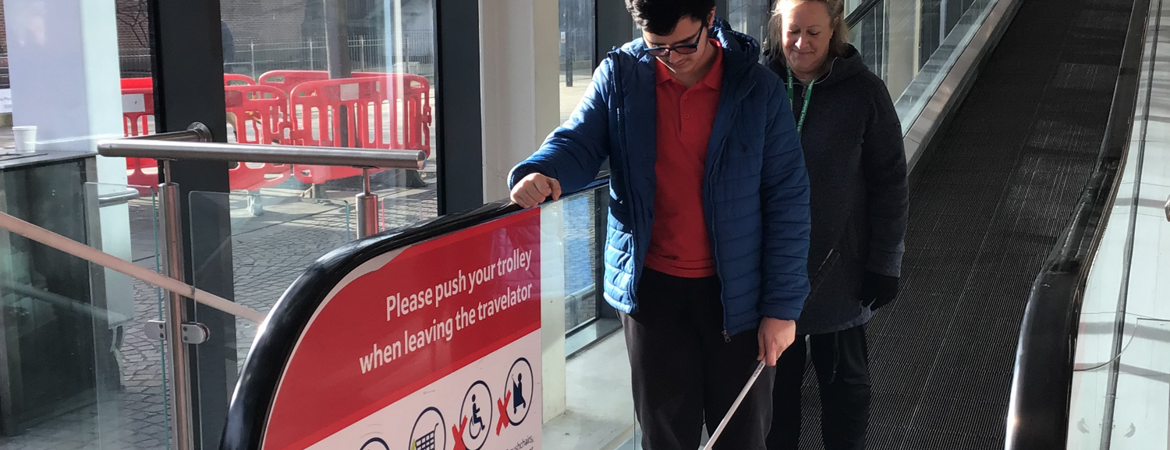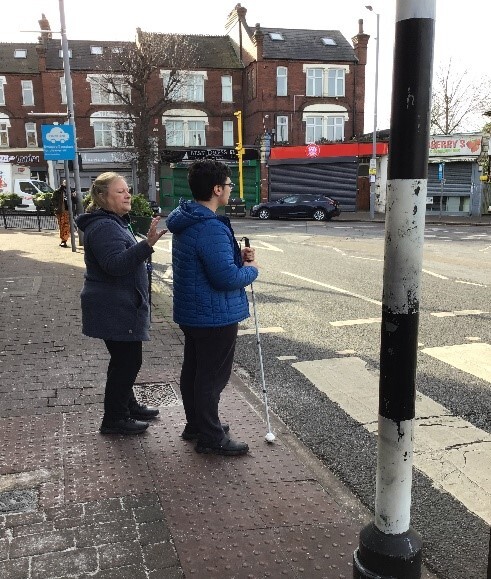The Importance of Habilitation Support for Children and Young People with a Vision Impairment
Back
The Importance of Habilitation Support for Children and Young People with a Vision Impairment
Chadia Filali-Moutei
Principal, Joseph Clarke School
Those of us who work with blind or vision-impaired children and young people have often heard it said: “Aren’t guide dogs clever because they know how to cross a road?”. This is a common misconception held by those who believe that not only do guide dogs know how to use a pedestrian crossing but they also know the way to Tesco, the local library or a friend’s home.
There is no denying that guide dogs are well-trained, keep their owners as safe as possible and are an invaluable companion for the vision-impaired person. It is, however, the vision-impaired owner themselves who is responsible for making the decisions involved in crossing a road safely and responding to the landmarks along the route to Tesco.
It is not simply a case of being given a guide dog and immediately being able to navigate around a town. People need to learn and hone specific skills – just as you would if you were learning to drive. And so, just as you would have a driving instructor, a vision-impaired person needs to learn these vital skills from the expert tuition and guidance of a qualified Habilitation Specialist.
The Habilitation Specialist is a key member of any team supporting people with a vision impairment. Here at Joseph Clarke School we are lucky to have a Habilitation Team comprising two very experienced specialists. This, however, is not luck as such, but rather a well thought-out, conscious decision on the part of the Leadership Team to invest in a crucial service which can unlock the potential of our pupils, maximising their independence, building their resilience and improving their emotional well-being.
Before a vision-impaired person can be matched with a guide dog, they must first learn many other vital mobility and orientation skills, courtesy of the Habilitation Specialist. A huge amount of work goes into supporting a young person to develop their environmental awareness of sounds, smells and physical landmarks. They then need to learn how to use this knowledge to remember and navigate a specific route and develop internal mapping of familiar environments. As a young person matures the Habilitation Specialist will introduce road safety skills; how to cross a road, how to make the decision about whether a car is approaching and, if so, at what speed. If they go on to have a guide dog in the future, it is at this point they would give the instruction to the dog to proceed with crossing the road. The guide dog does not make this decision for them.
Not only do these highly-skilled professionals work with children and young people on their mobility and orientation skills but they also support in all aspects of helping them develop independent living skills, such as washing, dressing, preparing food and choosing appropriate clothing – an essential part of any young person’s transition to adulthood.
These highly-skilled professionals are, however, hard to recruit. Not all children with a vision impairment are able to access education at specialist schools such as Joseph Clarke School and may receive a visit from a Habilitation Specialist infrequently or, in some cases, not at all. Their ability to unlock their future potential and live as independently as possible is therefore severely limited.
At Joseph Clarke School, we celebrate every time one of our pupils masters an every day skill that most people take for granted. It is fantastic to see them steadily grow in independence and do things for themselves. But this has only been made possible through the tuition, guidance and patience of our Habilitation Specialists.
Every day I am thankful to our two experts and I only hope that more children and young people could have access to this resource which is so vital to their future wellbeing.


